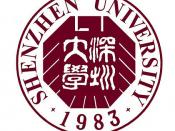When college students choose foreign languages as their majors, what are they supposed to learn? The traditional approach is to make a systematic study of the literatures of the target language, which used to be the practice of Chinese universities before 1949. Taiwan universities still follow such practice. After the PeopleÃÂs Republic of China was founded, Chinese universities adopted the Soviet model and Russian was taught everywhere in the foreign language departments of Chinese universities. As students had no foundation in Russian, the curriculum had to include a big proportion of language training, thus cutting down on the literature component. Gradually other foreign language majors followed suit. Since ChinaÃÂs economic reforms, linguistic courses have been introduced to the curriculum, such as general linguistics, lexicology and rhetoric. Amidst the economic development of the country, literature was considered irrelevant to the market economy and the curriculum tended to be more practical, skill-based and business oriented.
To make the matter worse, the National Syllabus for Juniors and Seniors Majoring in English(1990) excluded English Literature, American Literature and Linguistics from the list of required courses while making Reading and Writing compulsory. As a result, language skill courses have become dominant in the curriculum and foreign language departments in China are in danger of degenerating into language schools. At the same time, the training of core competencies such as analytical reasoning, lateral thinking has been more or less neglected, causing problems that cannot be ignored. Among foreign language graduates, one common recognized weakness is lack of analytical and organizational abilities. Even those best graduates are weak in good reasoning and coherent arguments(Dai Weidong et. 1997).
In the cognitive domain, Bloom(1956) classifies course goals into six hierarchical levels: 1. Knowledge, or the recall of information. 2. Comprehension, or the understanding and interpretation of information. 3. Application,



Good flow
Your essay flows well and links to next points well, over all its good.
0 out of 0 people found this comment useful.